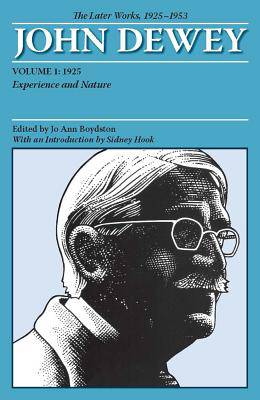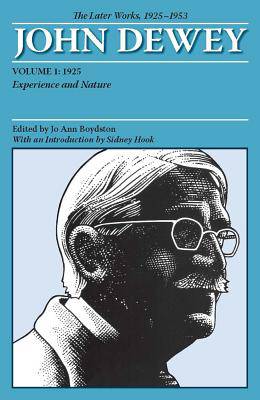
- Retrait gratuit dans votre magasin Club
- 7.000.000 titres dans notre catalogue
- Payer en toute sécurité
- Toujours un magasin près de chez vous
- Retrait gratuit dans votre magasin Club
- 7.000.0000 titres dans notre catalogue
- Payer en toute sécurité
- Toujours un magasin près de chez vous
The Later Works of John Dewey, Volume 1, 1925 - 1953
1925, Experience and Nature Volume 1
John DeweyDescription
John Dewey's Experience and Nature has been considered the fullest expression of his mature philosophy since its eagerly awaited publication in 1925.Irwin Edman wrote at that time that "with monumental care, detail and completeness, Professor Dewey has in this volume revealed the metaphysical heart that beats its unvarying alert tempo through all his writings, whatever their explicit themes." In his introduction to this volume, Sidney Hook points out that "Dewey's Experience and Nature is both the most suggestive and most difficult of his writings."
The meticulously edited text published here as the first volume in the series The Later Works of John Dewey, 1925-1953spans that entire period in Dewey's thought by including two important and previously unpublished documents from the book's history: Dewey's unfinished new introduction written between 1947and 1949, edited by the late Joseph Ratner, and Dewey's unedited final draft of that introduction written the year before his death. In the intervening years Dewey realized the impossibility of making his use of the word "experience" understood. He wrote in his 1951draft for a new introduction: "Were I to write (or rewrite) Experience and Nature today I would entitle the book Culture and Nature and the treatment of specific subject-matters would be correspondingly modified. I would abandon the term 'experience' because of my growing realization that the historical obstacles which prevented understanding of my use of 'experience' are, for all practical purposes, insurmountable. I would substitute the term 'culture' because with its meanings as now firmly established it can fully and freely carry my philosophy of experience."
Spécifications
Parties prenantes
- Auteur(s) :
- Editeur:
Contenu
- Nombre de pages :
- 464
- Langue:
- Anglais
- Collection :
Caractéristiques
- EAN:
- 9780809328116
- Date de parution :
- 01-04-08
- Format:
- Livre broché
- Format numérique:
- Trade paperback (VS)
- Dimensions :
- 145 mm x 215 mm
- Poids :
- 539 g

Les avis
Nous publions uniquement les avis qui respectent les conditions requises. Consultez nos conditions pour les avis.






